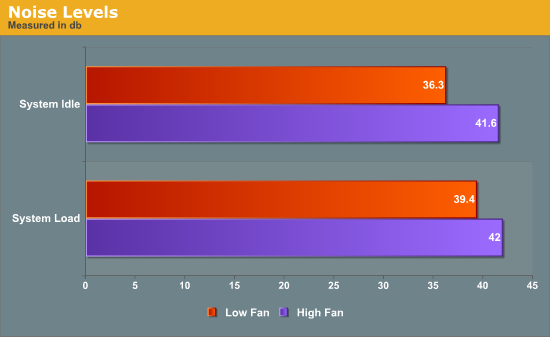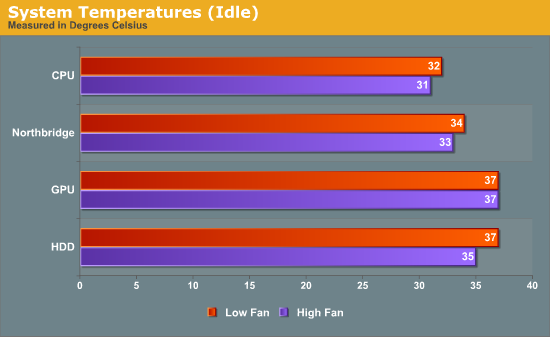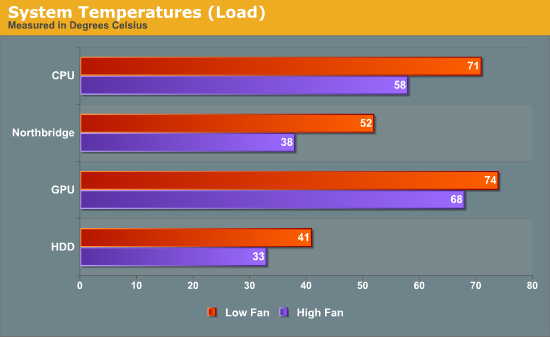SilverStone GD04 HTPC Case: Cool, Not Quiet
by Dustin Sklavos on December 25, 2010 12:00 AM EST- Posted in
- Cases/Cooling/PSUs
- HTPC
- SilverStone
- GD04
Thermal and Noise Testing
In testing the SilverStone GD04, I actually added components you're not going to see in the gallery but wound up needing just to keep the noise level down: the Zalman CNPS7000, which with the included FanMate controller was kept running at a low setting, and a Xigmatek Mono-Cool fan controller, the only controller I could find on NewEgg that fit into an expansion slot instead of a drive bay. The Xigmatek controller has headers for three fans, making it seem perfectly tailored to this task. Noise was measured using an Extech SL10 sound meter, while temperatures were measured conventionally using HWMonitor. The test system specs are as follows:
| Test Configuration | |
| CPU | AMD Athlon II X4 640 |
| Motherboard | ASUS M4A78LT-M AM3 MicroATX |
| Graphics Card | EVGA GeForce GTS 450 |
| Memory | 2x2GB DDR3-1333 |
| Drives |
LG HD-DVD/Blu-ray/DVDRW Combo Drive 1x Western Digital Caviar Blue 640GB |
| CPU Cooler | Zalman CNPS7000 |
| Power Supply | PC Power & Cooling 500W |
These aren't loud components to begin with, but remember: this is a media center case with three 120mm fans, and at least in my apartment it's going to be out in the open. Silence is paramount for a build like this. To generate load temperatures and noise, I ran 3DMark06 in a loop with Prime95 in the background and left it running for fifteen minutes at a time. The system was tested with the fan controller at its lowest and highest settings, and the sound meter was positioned one foot away from the tower, on a tripod, pointed directly at the side of the case.

While the fan noise wouldn't be a major issue for a normal PC that's probably going to be hidden under or near a desk, a media center PC really does need to run quieter than this. The first time I powered it up I was actually alarmed at how loud it was, and even though the character of the noise is a low whooshing, it's nonetheless very audible. Not good. So how are the thermals, then?


Thermals are actually pretty decent; remember this is a heavy artificial load being placed on the system. With the fans running at full bore everything's actually pretty good, but at low speed the processor's temperature becomes a bit worrying. Odds are good in actual use the CPU won't get this hot, but it's still not ideal. The idle temperatures are excellent at least.










68 Comments
View All Comments
cweinheimer - Tuesday, December 28, 2010 - link
Wow, really? I expect flame wars between competitors for attention, but for the writer to flame his readers? That certainly cant go on forever if you expect to keep readers. Oh, wait I see what you are doing, creating controversy so people will tune in. Definitely lame.SlyNine - Sunday, December 26, 2010 - link
They are obviously Anandtech, Your half cocked ways of pointing out weasel words and fallacies, While completely ignoring the context are baffling to me.You whip the noise floor so you can compare other unites to each other without any interference from out side sources, after all you're going to choose on based on how it performs vs. other units. Why do you want other metrics in there( Keep this in context now, you have a lousy track record) ?The noise floor should be considered in YOUR place/theatre. How will including theirs help you decide what unit is the best?
RobertR13 - Sunday, December 26, 2010 - link
I genuinely struggled to understand your question, so please let me know if I missed it all together. I understand this is anandtech, however there haven't been other case reviews here for almost 2 years, and done by another person entirely, so I was attempting to establish that these results were not comparable to anything else, which makes them of little to no value.Also, I brought up the noise floor issue, as well as the issue of the other components in the case, because without knowing these values, we don't actually know how much noise the case and fans actually generated. For all we know, the GPU fan could have been responsible for almost all of the sound measured, or the 36db measured at the side of the case could have been coming from his girlfriends blow drier in the next room. You see where I'm coming from?
MeanBruce - Sunday, December 26, 2010 - link
Robert is right dudes, if you are gonna compare, you first have to standardize!ZRohlfs - Wednesday, December 29, 2010 - link
There are a differences among the term deciBell. There are several measuring standards among the units. Two of the most synonymous are dBA and dBB. It is all how the different frequencies are factored into the measurement with typical emphasis on the mid level frequencies and a reduced empahsis on the upper and low range frequencies.still as long as we are comparing dBA to dBA results yes they are the same but really the best thing is to have the individual frequency ranges and representative sound pressure.
Just a thought.
Arneh - Saturday, December 25, 2010 - link
Great review. I'm personally a big fan of the SilverStone GD02. It's also an mATX case but you can squeeze in 3x3.5" (2 of them with vibration dampening), 1x5.25" ODD and an SSD above the ODD if you really wanted to (this isn't part of the specs but there's a gap in the tray above the ODD that allows you to squeeze in a 2.5" drive). The design is also more aesthetic in my opinion and suited for an HTPC. The two 80mm fans are also extremely quiet.mingus - Saturday, December 25, 2010 - link
I use this case and replaced the loud fans with what I thought would be quiet ones (800rpm Scythe), and it was still very audible. Tonight i unplugged all the case fans and it's doable, can hear very slightly from the sofa. I was very careful to select all quiet parts on this also.May not be right long term, will keep an eye on temps. most likely will rebuild the whole thing. Looking for case ideas, maybe gd02 who knows..
Belard - Saturday, December 25, 2010 - link
Okay, its a $100 case - so Silverstone included cheap fans.They should have done what others do, include a fan-controller that allows the user to choose how fast his fans run. With 3 HUGE 120mm fans, they simply don't need to run that fast - especially with todays cooler running CPUs.
There are low-cost solutions to fix this case.
1 - Buy an aftermarket fan controller ($10~30)
2 - Buy Antec Fans ($15~19 each) which include a 3-way switch (L / M / H).
My Antec P150 case has a single 120mm fan that runs on Medium - very little noise for a quad-core desktop system. For a HTPC... it should be even more quiet than what I have.
micksh - Saturday, December 25, 2010 - link
What is Extech SL10 sound meter? Can't find it in google. What is the minimum dBA level it can measure?At what distance from HTPC did you measure noise? Or, you think it's not important to write about? Like noise is at the same level regardless of how far you are from the source of noise?
If the noise is 36 dBA at 1 meter from HTPC it is ridiculously loud already. It should be around 20 dBA or less in order to comfortably watch movies.
Where is the analysis on what components contribute more noise? Was that case fans, CPU cooler or video card? How are we judging HTPC case without such analysis?
"These aren't loud components to begin with"
I'm sure they are.
1. I don't think EVGA was ever known for making quiet video cards. Get MSI Cyclone version and use MSI Afterburner to slow down fans. Edit BIOS if fan is too loud at minimum speed. Read ht4u.net reviews to find quiet video card.
2. What is PC Power & Cooling? How is that supposed to be quiet? Get Enermax Modu/Pro or Seasonic X or Nexus or some comparable PSU in terms of noise.
3. Get SSD for main drive and use quiet laptop 5400 rpm HDD in enclosure as a media drive. Mounted with ribbon washers, of course. Scythe SQD2.5-1000 is back on sale in US.
4. Replace case fans. Scythe Slipstreams, few Zalman resistors and you don't need to care about motherboard or fan controller. Even Antec provides horrible fans with their P desktop line targeted to quiet PC enthusiasts.
5. It may be to difficult to quietly cool 95W AMD quad core. Get lower powered CPU. And better CPU cooler maybe.
6. Read silentpcreview.com about basics of quiet PCs.
These 6 items will drive you closer to quiet HTPC. HTPC case itself can't protect your ears from loud components.
Belard - Saturday, December 25, 2010 - link
My P150 case is over 2 years old - it about 2-3 feet from me I can barely hear it (air noise)... barely a rumble from the drive & fan.(1) MSI, Gigabyte and H.I.S. make some pretty quiet video cards. I've seen a 6850 being used in normal desktop mode and it was fairly silent. I can't hear my *OLD* 4670 HIS card with its extra large dual-slot cooler.
(2) PC Power & Cooling is one of the BEST PSU companies in the world. But they don't usually make the quietest ones. Corsair or Seasonic PSUs would be a better choice IMHO.... you can't hear them.
(3) Yes... on the SSD (if possible). But 2.5" drives are not as reliable as a 3.5" drive. I have a Seagate 1TB 7200 RPM drive... I just put my head by my case - closest to the HD, I can't hear it... but more air noise. :)
(4) Agreed... many options. So much that Silver Stone should *USE* better fans or include a list of fans to use, rather than waste someone's time with useless fans.
(5) AMD stock CPU coolers generally do a fine job. 95w is typical for their performance CPUs, X3 & X4s. They do have some 45w X2~X4 CPUs which costs 20~40% more. And of course, theres after market coolers. Overall, the AMD coolers I've used in the past 4 years have been pretty good.